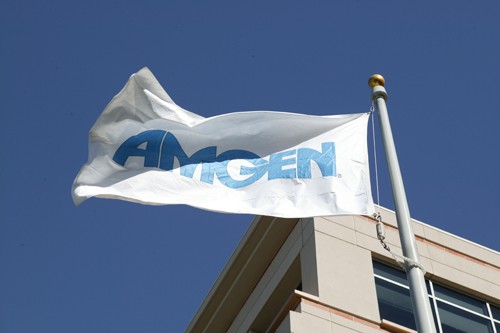
Amgen has benefited from a combative development programme for its multiple myeloma drug Kyprolis, but its latest trial represents a major setback.
A head-to-head trial pitting Kyprolis (carfilzomib) against another proteasome inhibitor – Takeda’s Velcade (bortezomib) – in newly-diagnosed myeloma patients failed to show a benefit for Amgen’s drug on progression-free survival (PFS).
The CLARION trial compared Kyprolis with Velcade – given in combination with melphalan and prednisone – over 54 weeks in myeloma patients deemed ineligible for a stem cell transplant. In both groups PFS came in at around 22 months, and there was a trend a higher risk of death or disease progression with Amgen’s drug.
That is a major reversal of fortune from last year, when Amgen reported a clear win for Kyprolis over Velcade as a second-line treatment for patients with relapsed or refractory myeloma in the ENDEAVOR trial.
Amgen said the trial was disappointing, but that the results should be seen in light of a “dramatic change” in the first-line treatment of multiple myeloma. In particular, melphalan is now rarely used in newly-diagnosed patients, although this was standard practice when CLARION was started in 2013.
Sales of Amgen’s drug were $512m in 2015 and continued to grow in the first half of the year, reaching $326m, a rise of more than 40%. That performance has disappointed some analysts however who have been looking for a bigger return on the $10.4bn paid by Amgen for Kyprolis’ developer Onyx in 2013 after the drug was first approved. First-line use would have given Amgen a chance to kick-start sales growth.
Amgen has made much of the fact that Kyprolis is the first irreversible proteasome inhibitor, so achieves more sustained inhibition of target enzyme than its reversible rivals. In theory, that should result in greater cell-killing activity.
Amgen’s chief executive Robert Bradway said recently that Kyprolis was a “top priority” for the company and “a backbone of multiple myeloma therapy for the foreseeable future”.
Geoffrey Porges, an analyst with Leerink, said the finding suggests that Velcade – and generics due to reach the market from 2017 when Takeda’s patents on the drug expire – will be “the proteasome inhibitor of choice in front-line patients”.
Meanwhile other new myeloma drugs – including Johnson & Johnson’s anti-CD38 antibody Darzalex (daratumumab) and Bristol-Myers Squibb’s SLAMF7 inhibitor Empliciti (elotuzumab) – are also expected to compete strongly with Kyprolis in the second-line setting.
Romosozumab filed
There was some better news for Amgen and partner UCB this week when the FDA started its review of romosozumab, their drug candidate for the treatment of osteoporosis in postmenopausal women at increased risk of fracture.
The agency is due to deliver a verdict on the drug, which has been tipped as a possible $1bn-plus blockbuster, by 19 July 2017.
Romosozumab did well in phase III trials – cutting the risk of vertebral fractures by around 75% versus placebo – but was less impressive on non-vertebral fractures.
This has led some analysts to suggest Amgen and UCB will have trouble competing with potential rivals such as Radius Health’s parathyroid hormone analog abaloparatide, which performed better on non-vertebral fractures – such as hip fractures – in phase III trials.




